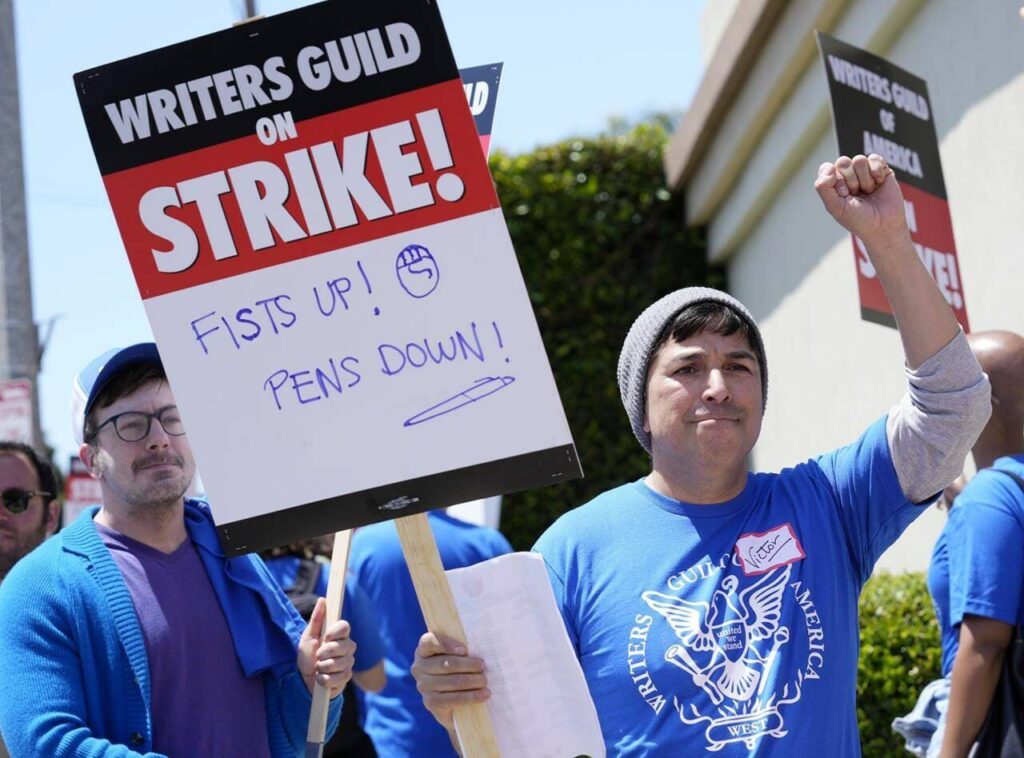For the first time in 15 years, the Writers Guild of America (WGA) has gone on strike, protesting against the Alliance of Motion Picture and Television Producers (AMPTP), the trade group for the studios, over issues relating to streaming, working conditions, and residuals.
The strike, which began on May 2nd, has disrupted the production of numerous television shows and films, causing job losses and economic damage.
President Joe Biden also commented on the ongoing strike by the Writers Guild of America on Monday evening, offering remarks ahead of a screening of the new series ‘American Born Chinese’ at the White House.
President Biden’s comments drew a round of applause from the crowd, as he called for a “fair deal” to be reached “as soon as possible”, reports ‘Variety’.
Hollywood is facing an uncertain future as it grapples with changing business models and evolving technologies. At the heart of the dispute is the question of how streaming has upended the traditional methods of content creation and distribution.
With the rise of platforms like Netflix, Amazon Prime, and Disney+, the demand for original content has soared, resulting in a surge of new television shows and movies.
However, this has not necessarily translated into more work for writers, who are facing shorter writers’ rooms and fewer job opportunities. As Sean Collins-Smith, a writer on NBC’s cop drama “Chicago PD” puts it, “I do think it’s a cost-cutting measure.”
The writers are demanding more job security, longer contracts, and better working conditions.
Another issue that has irked the writers is residuals, the payments they receive every time an episode or film they worked on is rebroadcasted.
In the streaming era, where shows and movies can be rebroadcast on demand, writers argue that they are not being adequately compensated for their work.

The industry has not yet found a way to equitably adjust their payment system to account for this change, leading to growing discontent among the writers.
The impact of the strike is being felt across Hollywood, with camera people, costume designers, and other professionals also out of work.
Late-night talk shows are the first to go dark, and the Milken Institute, a think-tank in Santa Monica, estimates that the previous strike in 2007 and 2008 cost California’s economy $2.1bn. The current strike is expected to have a similar impact, with some estimating that the losses could be even higher given the already weakened state of the industry due to the pandemic.
The strike has also brought attention to the working conditions of writers in Hollywood, which are often precarious and insecure. Los Angeles is the fourth-most-expensive city in the world, and many writers struggle to make ends meet despite their success.

Jake Lawler, a 24-year-old writer who moonlights as a stuntman, says, “You come to LA for the land of opportunity, but the peace-of-mind tax is way higher than anywhere else in the country.”
The strike has highlighted the need for better wages and job security for writers, who are often the creative force behind the industry’s most successful shows and movies.
For the studios, the strike poses a significant challenge as they navigate the changing landscape of the film industry. Before the pandemic, theatrical releases accounted for about 45% of a studio’s revenues for a big-budget film.
However, the pandemic has accelerated the trend towards streaming, with platforms like Netflix and Disney+ investing heavily in original content to attract subscribers. The competition is fierce, and studios are under pressure to create high-quality content that can stand out in a crowded market.
The strike has raised questions about the future of the film industry and whether it can continue to make a profit in the face of these challenges. Netflix, for instance, recently laid off hundreds of workers after losing subscribers for the first time since 2011, and the firm has said it will restructure its film department to focus on fewer, better films.
The studios are grappling with the question of how to balance the need for creative freedom and financial stability, especially as the streaming giants disrupt traditional revenue.
Also Read: Oscar Winning ‘Parasite’ is a blunt Allegory of Class-Warfare


